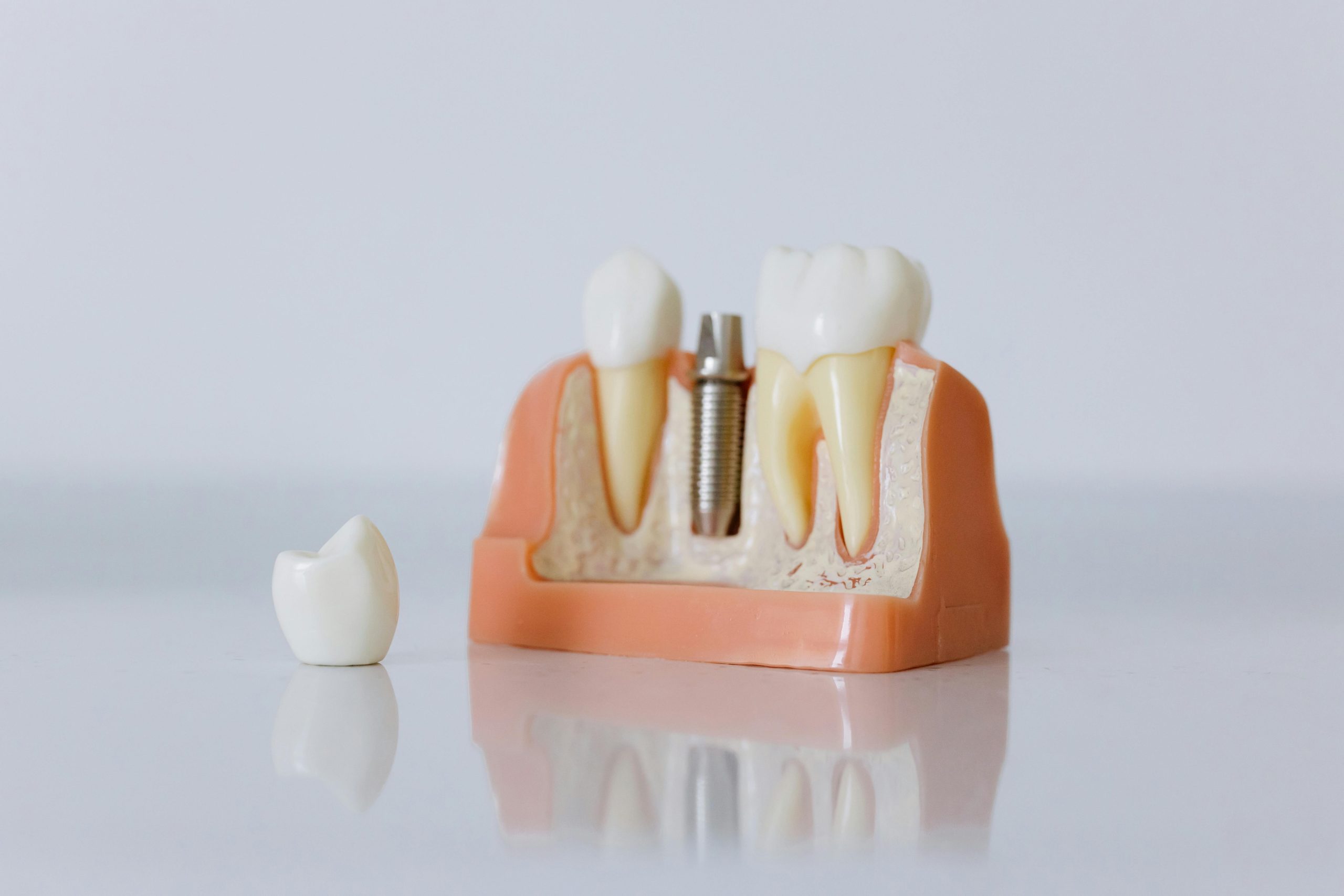Dental implants could be the life-changing solution you’ve been searching for. Whether you’ve lost a tooth due to injury, decay, or gum disease, the gaps left behind can impact more than just your appearance, they can affect your confidence, speech, eating habits, and even jaw health. Fortunately, modern dental implants offer a permanent, natural-looking replacement that doesn’t just restore your smile—it restores your quality of life.
In this blog, we’ll explore seven powerful benefits of dental implants and why they’re considered the gold standard in tooth replacement today.
What Are Dental Implants and How Do They Work?
Dental implants provide a modern solution for people who need tooth replacements because they work as natural-looking permanent replacements for missing teeth. The doctor inserts titanium surgical rods into the jawbone during surgery to serve as artificial tooth foundations. Time enables the implants to join with the bone to support your new teeth. The connection of implants to bone often keeps the jawbone healthy by stopping bone loss.
Structure and Components of a Dental Implant
Each dental implant system uses three components including the implant post, connecting piece, and final tooth. The titanium screw in an implant acts as the part that integrates with the jawbone. The abutment links the post to the crown which appears as a visible tooth replacement. It matches the natural tooth structure to work as normal while looking realistic.
The Surgical Process Explained
The dental implant treatment consists of different stages. First experts use different imaging tests plus X-rays and 3D scans to create a plan for surgery and check bone health. Under local anesthesia a surgeon inserts the implant post into the jawbone during this treatment. During healing time of months the implant fuses naturally with the bone. The custom crown is put into position after attaching the connection piece during the recovery phase. The extensive treatment steps create a reliable method to replace missing teeth permanently.
Top Benefits of Choosing Dental Implants Over Dentures

Dental implants represent a significant advancement in restorative dentistry, offering distinct advantages compared to conventional dentures. Unlike dentures, which can become unstable or require adhesives to remain in place, dental implants are surgically anchored into the jawbone, resulting in superior stability and function. This integration allows implants to mimic the performance of natural teeth, thereby enabling individuals to chew and speak comfortably and confidently.
Furthermore, dental implants play a vital role in maintaining jawbone integrity. By stimulating bone growth, they help prevent the bone resorption and facial changes commonly associated with tooth loss and prolonged denture use. In addition to their practical benefits, implants contribute positively to the aesthetics and durability of a patient’s smile, providing a solution that is both long-lasting and relatively low-maintenance.
For those seeking a dependable, permanent, and visually appealing tooth replacement option, dental implants offer improved comfort, support oral health, and enhance self-esteem. Their overall effectiveness makes them a preferred choice in modern dental practice.
Long-Term Durability and Natural Appearance
Dental implants offer the most important advantage of lasting for a very long time. Proper maintenance of dental implants is essential for ensuring their longevity and continued function. Unlike traditional dentures, which frequently require adjustments, relining, or complete replacement over time, dental implants—when maintained appropriately—have the potential to last a lifetime. Their anatomical design closely replicates the appearance and mechanics of natural teeth, facilitating a seamless integration with the patient’s existing dentition.
This naturalistic quality not only simplifies activities such as eating and speaking but also contributes positively to self-confidence, allowing individuals to engage socially without self-consciousness. Adherence to regular dental examinations and diligent oral hygiene practices is critical, as these measures help preserve the health, stability, and comfort of dental implants over extended periods.
Improved Chewing Ability and Jawbone Preservation
Implant treatment lets people eat all foods normally by giving back their complete biting ability. The difference between implant dental support and dentures becomes clear when you see that implants stay fixed while dentures may move around. The implants keep bones alive and healthy as they work with the jawbone.
Are You a Good Candidate for Dental Implants?
Assessing suitability for dental implants is a nuanced process that extends beyond a simple checklist. While dental implants remain a highly regarded solution for tooth replacement, candidacy hinges on multiple health and anatomical considerations. Dental professionals evaluate factors such as periodontal health and jawbone integrity, as these elements critically influence treatment outcomes. In cases where jawbone density is insufficient, procedures like bone grafting may be recommended prior to implantation. This individualized assessment ensures that the foundational conditions are optimal, thereby promoting implant stability and long-term success. Ultimately, thorough preliminary evaluation serves as the cornerstone for a functional and enduring dental restoration.
Key Factors Dentists Consider Before Implant Placement
People with good general health and strong gums who need enough jawbone to hold the implant qualify as the best dental implant patients. People without smoking habits or those preparing to quit make better candidates because smoking slows down healing. To achieve good implant results you need to stay consistent with taking care of your mouth.
Health Conditions That May Affect Eligibility
Unmanaged diabetes, cancer, or autoimmune diseases harm how fast a patient heals and limits implant performance results. Those who receive radiation therapy to their head or neck undergo additional difficulties. Complete medical testing helps doctors create proper treatment methods for both conditions.
Why GP Dental Is a Trusted Provider of Dental Implants
Choosing the right dental provider is crucial for the long-term success and comfort of your dental implant procedure. At GP Dental, we understand that getting dental implants is not just a clinical decision—it’s a deeply personal one. That’s why we go above and beyond to deliver exceptional care, ensuring every patient feels informed, confident, and supported from start to finish.
Expert Surgical Team and Advanced Technology
At GP Dental you will find expert dentists in implantology. Through modern equipment and methods they put dental implants in their right locations and achieve excellent results. The team continues to grow in knowledge while using modern techniques to stay ahead in dental implant technology.
Personalized Aftercare and Follow-Up
Dental implant success depends on proper aftercare treatment. GP Dental develops individualized healing checkups and support meetings for each patient after treatment. Their patient-first service keeps patients happy and comfortable throughout the treatment experience.
Conclusion
Tired of feeling self-conscious about your smile? At GPD Dental, dental implants provide a reliable and long-lasting solution to restore both the function and natural beauty of your teeth. Whether you’re dealing with a single missing tooth or multiple gaps, implants offer stability and comfort that traditional options can’t match. By scheduling a consultation, you can explore personalized treatment plans tailored to your unique needs and discover how implants can improve your oral health and boost your confidence. Don’t let hesitation hold you back, take the first step today toward a healthier smile and renewed self-assurance.
Frequently Asked Questions (FAQs)
1. How long do dental implants last?
Proper maintenance of dental implants is critical for their longevity and cost-effectiveness. Consistent oral hygiene practices, namely, thorough brushing and flossing are necessary to prevent infections that may jeopardize the integrity of the implant. Additionally, routine dental examinations enable early detection and management of potential complications. In essence, diligent care of dental implants helps to safeguard one’s investment and ensures a stable, enduring solution for tooth replacement.
2. Is the dental implant procedure painful?
Contrary to common assumptions, most patients report that the dental implant procedure is less painful than a typical tooth extraction. Effective pain management strategies, such as local anesthesia and, when necessary, sedation, are available to address individual comfort levels. These measures enable patients to remain relaxed and experience minimal discomfort during the procedure. Ultimately, the aim is to ensure the entire process is as comfortable and stress-free as possible.
3. How do I care for my dental implants?
Taking care of dental implants involves brushing and flossing daily, just like natural teeth. Regular dental check-ups are also essential to monitor the health of your implants. Maintaining good oral hygiene routines helps ensure your implants stay strong and healthy for many years. Consistent care is key to preserving your smile and overall oral health.
4. Can smokers get dental implants?
Smoking negatively affects healing after dental implant placement and increases the risk of implant failure. Patients interested in getting implants can proceed if they commit to quitting smoking during the healing period. Stopping smoking helps improve healing and the long-term success of the implants. Your cooperation plays a vital role in achieving the best results.
5. Are dental implants covered by insurance?
Dental implant insurance coverage varies based on your specific plan and provider. It’s important to consult both your dental office and insurance company to understand what expenses are covered and any out-of-pocket costs you might expect. This way, you can plan your treatment with full clarity and avoid surprises.


